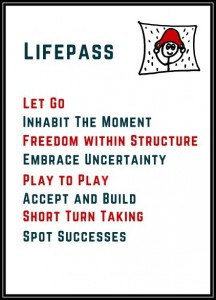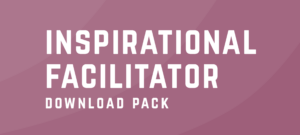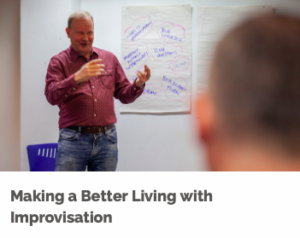Eight secrets for applying improvisation in life and at work

‘I’ve been learning to improvise, and I love it. I’d like to know more about what’s beyond the stage – this idea of applying improv in life and at work.’
Great, that’s what we call Applied Improvisation, which is usually described as the application of improvisational concepts, skills and mindsets in non-theatrical contexts. It’s not an ideal description, but it does serve to distinguish what we are doing from the business of stage improv. That’s important because it’s the theatrical stuff that is best known to many, thanks to Whose Line Is It Anyway and suchlike entertainments.
It’s also tempting to define AI as the collection of activities typically used to train improv performers. That gives you a practical tool set, which you can certainly take beyond the theatre. But in doing so, you’d lose any sense of philosophy, while confining and reducing you to exercises that may have proved their theatrical worth but leave you dangerously exposed and decontextualised away from the stage.
So here’s a simple model that makes sense of what we love about improv, honing in on the aspects which are most distinctively improvisational: we are delineating Applied Improvisation by the LIFEPASS concepts. That’s an acronym, standing for Let Go, Inhabit the Moment, Freedom Within Structure, Embrace Uncertainty, Play to Play, Accept and Build, Short Turn-Taking and Spot Successes.
‘Ok, LIFEPASS – how do I use that?’
We can start by seeing these as skills. You can develop them, get better at them and choose to apply them more or less in selected circumstances. Each also tells you a characteristic of improvisation. If they are present, it’s probably improvisation. If absent, or you are seeing their implied opposites – such as Holding On (to a plan or a script), Drifting away to thoughts of what you did before or might do later, Demanding Certainty (or acting as if things were certain), etc, then probably not.
The LIFEPASS skills are a powerful and appropriate resource for making progress in complex adaptive systems. It’s worth acknowledging that many of the interactions of the world and the organisations within it are better described as complex and systematic, than as mechanistic and engineered. That is to say that people make a difference to what happens, and that the recursive interactions of people (as with other complex adaptive systems, such as weather, traffic with drivers, stock exchanges) are generally less predictable than the smooth operations of well-crafted machines.
That’s what makes it worthwhile recognising that the scripts of life and work are not always going to be enough to steer us through, and that improvisation may offer something useful not just for when things go wrong, but as a deliberate first choice.
‘Yes, I reckon I do see the world a bit differently – it’s possible to create things together, as we go along.’
Indeed, our understanding of how things work and our governing metaphors transition historically from levers to watches to computers to living beings.
As improvisers (which is to say as humans), we make progress typically by a process of co-creation – turn by turn and thus emergent moment by moment. Improvisation can be solo, but most often in our organisational contexts is a collaborative effort. It trades on the expectation of the sum being greater than the parts, precisely because of the (usually sadly unexpressed) potential of the combined resources skilfully worked by the improvising parties. It is amazing what we can accomplish together when we operate in this way.
‘It’s still theatre, though, right?’
It so happens that many of the most visible and studied aspects of improvisation are found in performing arts, notably theatre, music and dance. (And it’s usually worth considering sport as another, somewhat contrasting arena in which improvisation is readily manifest and often celebrated.) It follows that there’s lots to be learned about improvisation from these fields.
For example, a great improvisation performance is realised in real-time. It has no script, no rehearsal, no director – which makes its process of creation in bold contrast to say the performance of a Shakespeare, Pinter or Mamet play. Yet ‘TJ+Dave’, a Comedy Store Players mini-epic, and many many other improvised shows are no less dramatic, funny, poignant, character-rich, story-satisfactory than those of the celebrated playwrights and their directors.
Even making no allowances for their improvisational process, they are (can be, and aspire to be) aesthetic equals. That is true even if their own aesthetic may be pretty minimal – not much scenery and strong on mime, for example.
Same for a Mozart, Paganini, miles Davis or Keith Jarrett musical improvisation. In performance with an audience, they are high-risk because they are aiming not for a ‘shitty first draft’ (in the misguided expression used by Service Design people), but for ‘something wonderful right away’ – and are rightly applauded when they accomplish it, not only for their courageous process but also for the product.
What’s right and wrong about a ‘shitty first draft’?
What’s misguided about ‘shitty first draft’ is that the aim is not poor quality, but a fast output. It wants to allow for people to take a risk as to how good it may be, that will carry no negative consequence or blame for its producers, that is a first go at something that may be improved later. The idea is to encourage – even insist on – having a go, while being permissive as to quality, because we want a fast output that we can use to advance a bigger process. If it happens to be good, it would be crazy to fault it for not being shit.
What then? How about ‘scribbled first draft’ or ‘scrabbled first draft’? Or ‘disposable first draft? Or – for the minimalists – ‘first draft’?
Or perhaps a switch to an acronym, like a GEFN, pronounced ‘Geffen’, meaning Good Enough For Now. That’s my offer, which is itself a GEFN.
You’re drifting away from the point, which was about Applied Improvisation.’
Yes, that can happen. We’ll stick to the point at this event in London Making a better living with improvisation – please do come and join us. Discount for blog readers, using the code BLOG.
Get free tips on how to develop confidence and creativity straight into your inbox.
Paul Jackson Associates Limited. A registered company in England and Wales.
Company Number 09564618. VAT Number GB 213 37981.
Registered Address 10 Greville House, Lower Road, Harrow on the Hill, Middlesex, HA2 0HB.
Postal Address 34a Clarence Road, St Albans, Hertfordshire, AL1 4NG
Telephone 01727 843 820
Mobile 07973 953 586
© 2009-2016 Paul Jackson Associates / The Improvisation Academy – All Rights Reserved




![DJI Systems - web design | marketing | admin systems | consulting - [ anglesey / wales ] DJI Systems - web design | marketing | admin systems | consulting - [ anglesey / wales ]](https://djisystems.com/banners/DJI_WebBanner_lt.png)
